Contract monitoring is crucial to your business’s ability to realise the expected benefits of its agreements. This activity needs to be in place for your business to know whether or not contract performance is being achieved to a satisfactory level.
Without dedicating time to contract performance monitoring, different types of risk from your third parties could go undetected and impact outcomes. This includes poor contract and vendor performance, unfulfilled obligations and the potential for non-compliance with regulations.
Teams should work collaboratively when monitoring contracts, sharing insights and early warnings of when and where action needs to be taken.
However, not all businesses will be in the position to do this effectively - especially if information about their contracts is fragmented and teams aren’t following the same processes.
In this article, we’ll show you how to create an effective contract monitoring plan, how to monitor areas such as milestones, risk and performance across your portfolio and how using Gatekeeper can help you to implement contract monitoring best practices.
Defining contract performance
Contract performance is a measure of whether or not the terms of an agreement are being fulfilled. This fulfilment can be by your business, on your business’s behalf or by your vendor.
Monitoring contract performance allows you to:
- Determine the quality of the performance - have the terms been fulfilled to a minimum standard or has it exceeded expectations?
- Assess areas of the business that are being impacted by poor contract performance and build management strategies
- Minimise business disruption caused by late deliveries or poor-quality services
- Hold vendors accountable for obligation fulfilment and acceptable levels of performance
- Build internal processes that can adapt to change if poor contract performance leads to consolidation or the end of a relationship
- Identify contract risks early on and create effective mitigation strategies.
Building an effective contract monitoring plan
Given the nature of a contract’s lifecycle, it's never entirely static. Your contract monitoring plan should bring a level of control and consistency to the business, so you can always stay one step ahead of new, and potentially impactful, events.
Successful monitoring requires an organisation-wide, collaborative approach to improving outcomes.
Accountability for contract outcomes should be shared. Businesses that rely too heavily on their Contract Managers or Legal Teams will need to adjust their approach."
There are five key steps your organisation needs to follow to work together and build an effective plan. You can refer back to these steps at any time and use them as a contract monitoring checklist - helping your teams to stay on track and keep your portfolio under control.
5 Contract Monitoring Best Practices
Below, we take a look at the steps that make up a successful plan and some contract monitoring best practices each step should include.
1. Decide what to monitor and by whom
Trying to monitor every element of a contract can become time-consuming, encouraging teams to de-prioritise the process.
Deciding what to monitor will help your business to focus closely on the aspects of the contract (or its lifecycle) that are most aligned with its objectives, any requirements from local regulations or even customer expectations.
Look beyond your Contract Managers or Legal Team to take responsibility for monitoring by aligning teams to the areas you have chosen For example, include Finance Teams if you’re monitoring contract spend and consult Legal if you’re monitoring time-to-signature. This will help to drive collaboration and embed monitoring as a standardised process.
2. Centralise the information and provide relevant access
Successful monitoring is built on the ability to easily see, search and locate relevant information. Centralising your contracts and their relevant items in a single, secure location will provide your business with a reliable source of truth about its portfolio. It will also ensure that teams are monitoring accurate, up-to-date information which will inform later decisions.
If your business is monitoring contract compliance, for example, it’s vital that all certificates and documentation are kept in a central repository. Access should be given to the teams made accountable for monitoring in the previous step. This will prevent them from spending valuable time looking for the information they need, streamline the monitoring process and make it easier to prove compliance in the case of any audits.
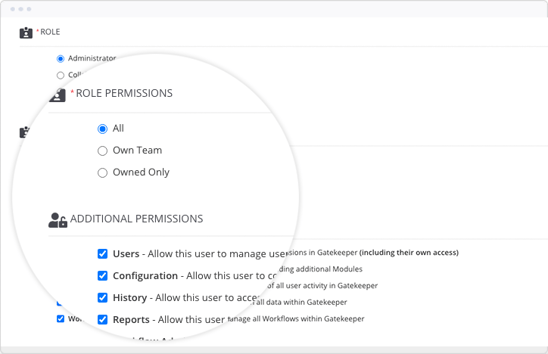 Set role-based permissions within Gatekeeper to give the right teams the right access
Set role-based permissions within Gatekeeper to give the right teams the right access
3. Build in reviews, analyse the data and report findings
Businesses need to tread carefully to ensure that contract monitoring doesn’t become a passive task or a box-ticking exercise. Teams should actively participate in contract monitoring by building it into their internal processes and making time to analyse and review the contract data.
Once data has been collated on how many contract milestones have been missed, for example, teams should come together to discuss how and why it happened and how this can be prevented in the future. By analysing the data and reporting back to the business, contract monitoring leads to proactivity and prevention.
4. Take action to protect your business
Effective contract monitoring leads to action, with teams working together to improve contract outcomes. If your data highlights that your business - or its suppliers - are at risk of non-compliance, start opening up the lines of communication and putting risk mitigation strategies in place. If key milestones are being missed, assess who is accountable and what can be done to help them keep ahead of important dates.
By monitoring your contracts, you will be able to:
- Identify issues and either remedy or escalate accordingly
- Evaluate relationships with suppliers which could raise consolidation opportunities
- Monitor contract performance and drive corrective action if required
- Improve contract outcomes as a result of early action
- Use learnings to renegotiate better terms in the future
5. Optimise your contract monitoring process
Once you have set up an effective plan and begun executing it, it’s important to review your learnings and use them to improve contract monitoring processes moving forward.
Centralising your contracts in the first place may have been difficult based on how fragmented they were to begin with, reporting may have caused a bottleneck while you visualised results or escalations may have happened too late, resulting in risk anyway.
The higher your business’s level of contract management maturity, the better your monitoring will be. Consider how you can automate your process with technology."
If your business is experiencing low levels of contract management maturity, including fragmented contracts, high volumes of manual work and inefficient processes, investing in a contract management solution will provide a solid foundation for your contract monitoring plan and its execution.
How Gatekeeper optimises contract monitoring
Optimising your monitoring process with contract management software will save your team's time, boost collaboration and minimise overall contract risk. Gatekeeper allows your business to automate each stage of a contract’s lifecycle, giving you greater visibility and control when it comes to monitoring contract milestones, compliance and overall performance.
Gatekeeper helps all businesses to successfully execute a contract monitoring plan with:
- A centralised contract repository: allowing you to store all agreements and related documentation in one secure location and create a single source of truth across your portfolio. This brings risks, key dates and expiring documents into focus.
- Secure access controls: allowing you to share contract data with relevant stakeholders and teams for increased collaboration and shared contract visibility of the contracting process. Sharing access to important information also shares the responsibility for contract outcomes.
- Automatic notifications: giving your stakeholders, suppliers and contract owners prompts when action is required - whether that’s a compliance document reaching an expiry date or a contract coming up for renewal. These alerts allow monitoring to become a proactive process and help you to stay ahead of contract milestones.
- Dashboards and reports: providing visual representations that streamline data gathering for monitoring purposes. Easily identify contract milestones such as agreements coming up for renewal, the RAG status of each agreement and overdue events that need your attention. This saves teams from spending valuable time on data collection, analysis and reporting. Instead, they have critical information at their fingertips.
- Kanban Workflows: giving your business an immediate view of where all contracts are in the process, making them instantly easier to monitor through each step of the lifecycle and to spot and resolve potential bottlenecks. Using SLAs on the phases can also trigger any escalation processes - vital if you’re tracking performance.
Below, we take a deeper dive into how Gatekeeper optimises contract management and monitoring within the key areas of milestones, risk and performance.
1. Stay ahead of contract milestones
Contract milestones, and renewals in particular, can easily be missed when data is fragmented, there’s a lack of accountability for agreements and when contract monitoring isn’t a priority.
The inability to easily find, see or review contract milestones leads to ineffective monitoring and can result in delinquent spend as a result of auto-renewal clauses.
In addition to the contract repository offered within Gatekeeper, users can also benefit from its AI-Extract solution allowing them to auto-extract all key metadata including start dates, end dates and notice periods. These dates can be easily captured and stored, removing manual overheads often associated with data input.
Artificial Intelligence combined with centralisation streamlines contract monitoring by giving contract owners instant visibility of upcoming milestones that require action."
Gatekeeper further supports the monitoring of contract milestones by using key dates to trigger notifications to stakeholders - letting them know early action is required. They can also be used to trigger contract renewal workflows in the Kanban Workflow Engine, allowing all teams to see where the contract is in the process and if any bottlenecks have occurred.
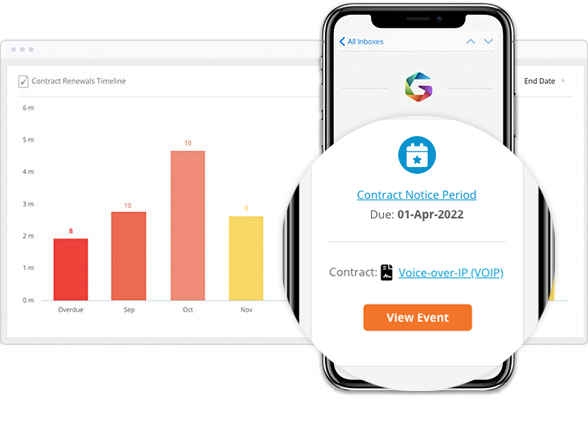 Act ahead of upcoming renewals with notifications from Gatekeeper
Act ahead of upcoming renewals with notifications from Gatekeeper
Using Gatekeeper to monitor contract milestones allows your business to:
- Keep one step ahead of your renewals and prevent delinquent spend
- Build in time for collaborative contract reviews ahead of negotiations
- Eliminate contract administration related to finding key dates and chasing owners
2. Identify and mitigate contract risk
When contract risk goes undetected, your business is left vulnerable to reputational, financial and regulatory consequences. In a worst-case scenario, undetected and unresolved contract risk can lead to operational failure.
An inability to monitor contract risk will negatively impact contract outcomes - minimising the benefits your business realises from its agreements.
Gatekeeper offers a dedicated Risk Module that allows your business to effectively monitor the level of risk within your contract portfolio, including any risks introduced by your suppliers. You can monitor risk by supplier, type and category, as well as assign ownership to drive accountability for any mitigation strategies.
Take contract monitoring one step further by analysing and reporting on the existing risk in your portfolio via the Risk Dashboard. This visualised data allows you to easily identify and prioritise risks that require action based on their RAG Status, while using the dashboard as a reporting tool will also raise awareness throughout your business.
Active contract monitoring is a key part of due diligence as it allows your business to take corrective action or escalate issues quickly in serious scenarios such as a contract breach."
With Gatekeeper, businesses can assign a ‘Risk Score’ to the aspects they are monitoring - whether that’s compliance or contract obligations - and have confidence that their risk mitigation strategies are being triggered if that score is met. The Risk Score can be used to automatically trigger mitigation and escalation strategies, which can be configured in a contract workflow.
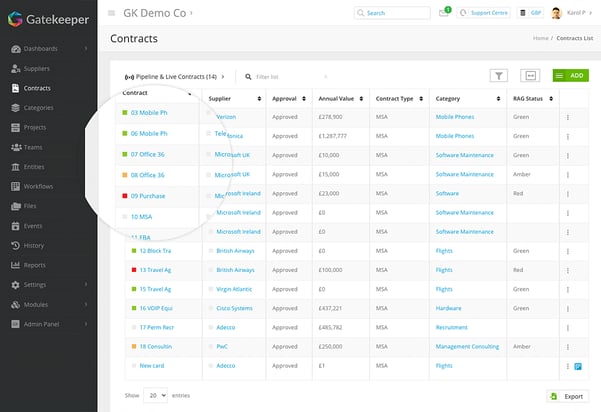 Easily identify contract risk with RAG Status within Gatekeeper
Easily identify contract risk with RAG Status within Gatekeeper
3. Track contract and vendor performance indicators
Vendor performance should be continuously monitored against defined Key Performance Indicators to ensure that your business is realising the best possible contract outcomes. However, this ongoing activity requires dedicated time and resources - especially if there are multiple areas of performance being monitored.
Balanced Scorecards allow you to automate performance monitoring over time. Data visualisation allows businesses to easily identify areas of poor performance and communicate with vendors as early as possible to drive improvements.
This data is captured from automated surveys sent to your teams, providing a single source of truth about performance while removing the need for Excel spreadsheets or emails back and forth.
Effective contract monitoring means evaluating performance, identifying areas for improvement and holding stakeholders and suppliers accountable for better results."
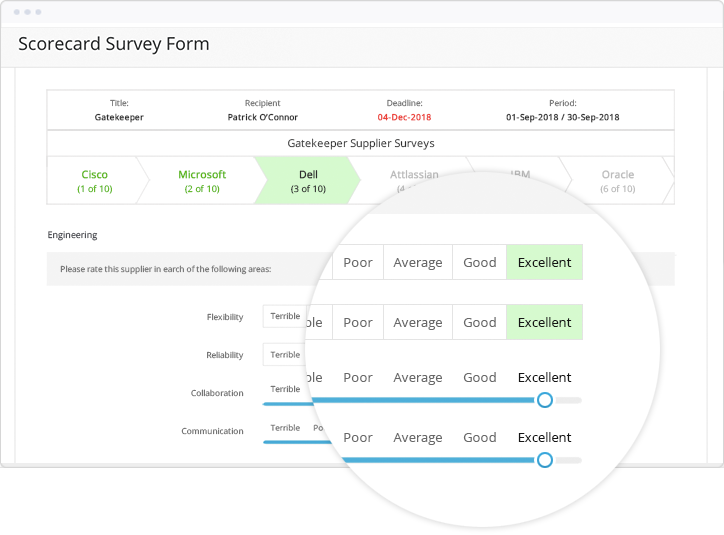 Monitor performance with Gatekeeper's Balanced Scorecards and Surveys
Monitor performance with Gatekeeper's Balanced Scorecards and Surveys
Wrap Up
Businesses that want to achieve the best possible contract outcomes, have confidence in their level of compliance and protect their operations from any risk need to define and execute an effective contract monitoring plan.
Contract performance monitoring should not be a passive activity that is thought of every once in a while. Instead, it should be a continuous and ongoing process that is contributed to by all relevant teams. Analysis and reporting are both important elements of contract monitoring as it holds teams accountable and drives collaboration when seeking resolutions.
Only through active contract monitoring can your business truly understand what is currently happening within its portfolio, pre-empt any significant changes and mitigate potential issues."
If your business’s view of its contract portfolio is fragmented and information is hard to find, risk - whether it’s financial, regulatory or operational - quickly becomes hidden. The activity of contract monitoring also becomes at risk of being ignored as it takes teams too much time and manual effort.
Gatekeeper improves contract monitoring through automation, artificial intelligence and increased visibility via its central repository. It eliminates manual overheads and allows monitoring to become an integral and valuable process in a business’s daily operations.
To find out more about how Gatekeeper can support your contract monitoring efforts, get in touch or book a demo.












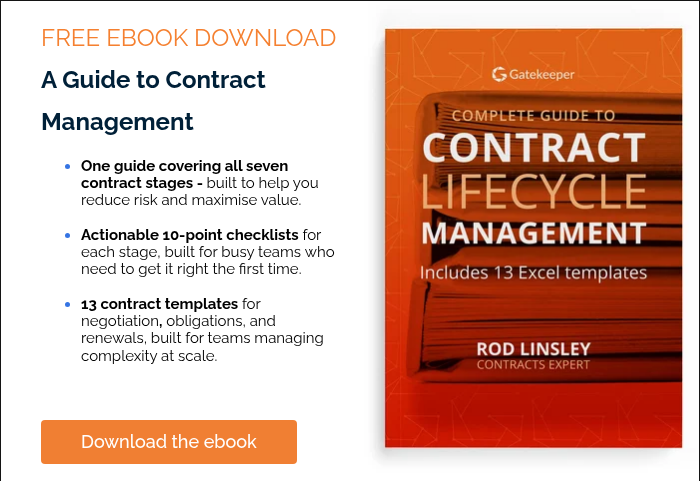




.png)
.png)
.png)
-4.png)